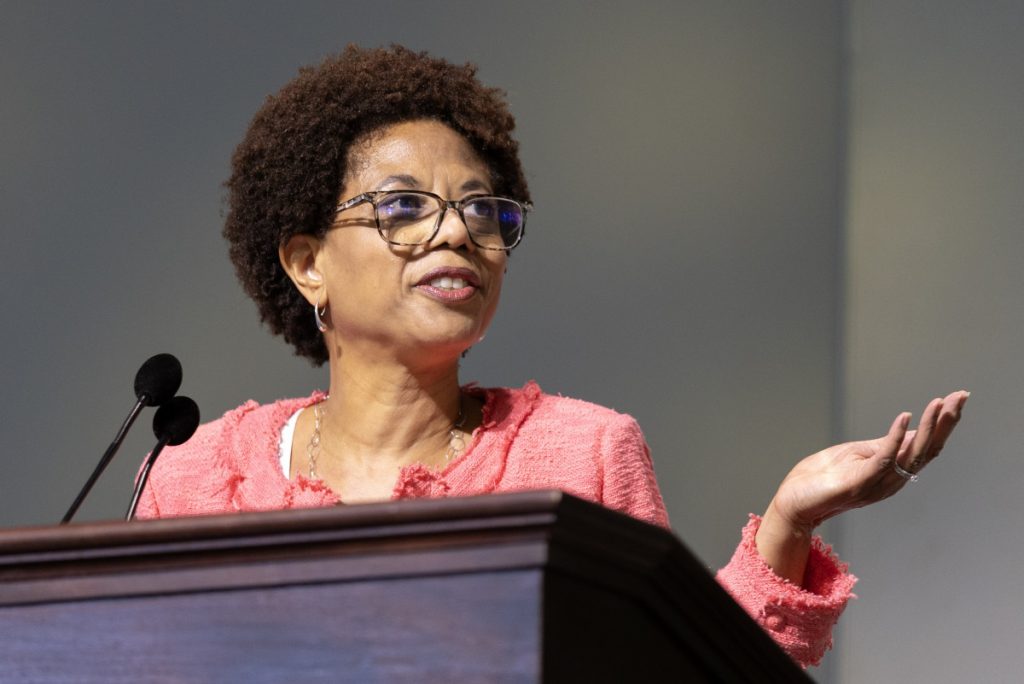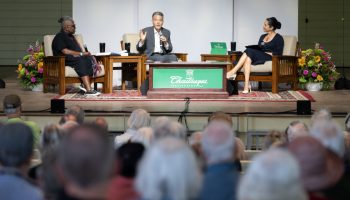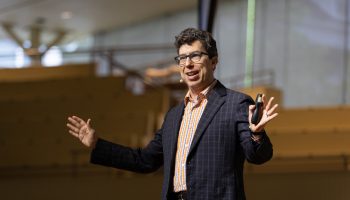
Melody Barnes, founding executive director of the University of Virginia’s Karsh Institute of Democracy, delivers her lecture on “The American Presidency and Its Great Expectations” Thursday in the Amphitheater.
Melody Barnes delivered her lecture “The American Presidency and Its Great Expectations” a little less than 12 hours before the first presidential debate of the 2024 election. That begged the question: Why? Why spend a week of the Chautauqua Lecture Series dedicated to the theme of “The Evolution of the Modern Presidency”?
“While often misunderstood and sometimes maligned, make no mistake, the presidency and the executive branch have in some way touched everything — everything — from the coffee maker that you used this morning, to the road that you used to get here today, to the people with whom you engage in your office or in your apartment building, to the food that you will have for lunch,” Barnes told her audience Thursday morning in the Amphitheater.
The power vested in the executive office profoundly shapes the everyday lives of everyday Americans, Barnes said. And she would know: Barnes is the founding executive director of the University of Virginia’s Karsh Institute of Democracy, and a public servant with more than 20 years’ experience crafting public policy. She served as assistant to the president and director of the White House Domestic Policy Council under President Barack Obama, and was recently named one of two inaugural Perry Fellows in Democracy at Chautauqua Institution.
The White House can be a confusing place, often understood through the lens of Aaron Sorkin’s “The West Wing.” Barnes and her colleagues often drew direct lines between their jobs and the jobs of fictional characters like Chief of Staff Leo McGarry and his deputy Josh Lyman, and Press Secretary C.J. Cregg, because that’s what people understood best.
“After all, what we know is that the apparatus surrounding the presidency is often opaque, and it feels less accessible to everyday people — certainly less understandable than Congress, the place where I began my career in Washington, and the first institution that was constitutionally crafted by the framers,” Barnes said.
Congress, however, is a critical actor in determining how the presidency works — a key entry point, she said, for how citizens think of the presidency itself because of how deeply intertwined the two branches are in the practice of governing.
Her lecture and the week’s topic, Barnes said, could not be more timely. As the country looks forward to “one of the most consequential presidential elections in our history, … we find ourselves at a pivotal moment.”
At this moment, only 20% of Americans say they trust the federal government to do what is right “most or all of the time,” according to the Pew Research Center.
“When citizens lose faith in the government … believe that those in power don’t hold their best interests at heart, then the foundation of self-government begins to erode and the body politic begins to fail,” Barnes said.
Much of that discontent — toward Congress, toward the Electoral College — is also directed toward the presidency.
“Voters are keenly aware that in two presidential elections, in our lifetimes, the presidents have been elected without a majority of the electoral vote,” Barnes said, and the results don’t appear to “represent the views and the sentiment of the public.”
In her lecture, Barnes set out to grapple with a few questions: What is and what should be the purpose of the president and the executive branch? What is the president’s role in advancing an agenda that addresses the nation’s needs? The final question: Does the 21st-century presidency even work?
To answer these questions, Barnes looked to the nation’s past. She took her audience from the Founding Fathers and George Washington’s intent to establish a tradition of reverence and respect for the executive office — without “monarchal or artificial airs” — through Dwight D. Eisenhower’s establishing of interstate highways, up to the modern era. It’s a long history, with an expanding body politic, an enlarged geographical reach, and a growth to industry and economy that the founders couldn’t have imagined. On top of that?
“The opportunities and challenges of the 21st century are legion — from the rise of the global economy, rapid technological advancements, to sophisticated threats to national security, along with increased concerns about environmental pollution and ecological harm, reduced mobility and increased, persistent steep in inequality, and, of course, a not-so-long-ago crisis in global public health,” Barnes rattled off. “More and more is being demanded from the government today.”
Against this backdrop, she said, what is — and what should be — the role of the president in lives of everyday Americans, and in advancing an agenda that meets their needs?
“Across time, many, many presidents have sought to do the most good for the most people,” she said, “often expanding the depth and breadth of the executive authority along those lines.”
Eisenhower created the interstate highway system. Richard Nixon’s establishing of the Environmental Protection Agency. Before that, Theodore Roosevelt “transformed the presidency by vastly expanding presidential powers and placing the presidency at the center of the political arena in a way that had never been before,” Barnes said.
“Roosevelt used the presidency to transform welfare legislation, government regulations and spearhead the conservation movement. We can still see Roosevelt’s legacy in FDR’s new deal, Truman’s Deal, Kennedy’s New Frontier and LBJ’s Great Society,” she said.
In fact, Lyndon B. Johnson and his administration are a “salient case study in presidential authority.”
Regardless of one’s opinion of Johnson’s legacy and the Vietnam War, Barnes said, his presidency “serves as master class in the use of presidential power to touch the lives of the American people.”
“Johnson believed in an active government, and he believed the president should leverage the power of the office to transform the country,” Barnes said. “… The Great Society agenda, as I mentioned, was bold and vast. It included Medicare and Medicaid. Head Start. The Elementary and Secondary Education Act. Higher Education Act. Immigration and Naturalization Act. The Freedom of Information Act. The establishment of the Corporation for Public Broadcasting.”
The list went on, and that was before Barnes even mentioned Johnson’s civil rights legislation.
“His aides were adamantly opposed; they said, ‘Look, this is noble, what at what cost?’” Barnes said.
Johnson’s response? “Well, what the hell is the presidency for then?”
“And in doing so, he transformed America,” Barnes said.
She drew on her own experiences working in the Obama Administration and the president’s agenda for K-12 education, affordable college, and the Affordable Care Act. Barnes recounted the long, hard road to the ACA’s passage.
“Now, I know that the debate continues over the Affordable Care Act,” she said. “But I firmly believe that President Obama was right and time will support his sentiment. When COVID struck, the Medicaid expansion program was a life saver. Literally.”
Now, in 2024, President Joe Biden has passed an “impressive, Great Society-era-like suite of legislation,” Barnes said. But still, according to polling, Americans are deeply dissatisfied.
As a result, “frustrated by a divided Congress, animated by his desire to respond to the public and with his campaign for re-election on the line, the president has sometimes turned to executive authority,” Barnes said — student debt relief being the most prominent example.
Barnes emphasized the power the president holds through mechanisms like the bully pulpit, and the power of a compelling oratory.
With all of this in mind, Barnes came to her final question: Does the 21st-century presidency work? It depends on how one views the office. Ultimately, the framers of the U.S. Constitution “expressly designed political order that aimed to remove dependency on the arbitrary will of those in positions of power,” Barnes said. “This was one of the key differences for them between arbitrary versus limited government. The presidency works best when situated in its broader institutional context, in which Congress is sometimes its adversary, but sometimes its partner.”
So when people go to the polls this fall, Barnes asked them to consider: What role will your representative member play with regard to the presidency? There are tensions large and small within the branches of the federal government, but those tensions can be harnessed for the benefit of the nation.
“Those productive tensions, even within the presidency itself,” Barnes said, “might just be what the framers of the Constitution had in mind as they set in motion a system of collective self-governance aimed at the common good.”




